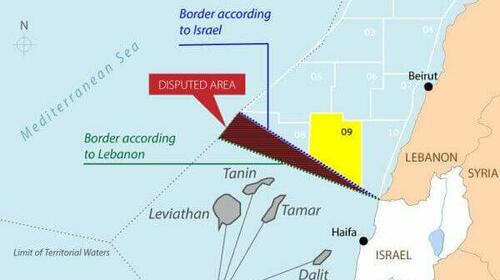Hezbollah Threatens To Strike Israeli Gas Production Facilities
A dispute between Lebanon and Israel over offshore drilling rights has devolved into threats against Israeli natural gas facilities leveled by the leader of Lebanese political and militant group Hezbollah.
“All fields are under threat…no Israeli target at sea or on land is out of the reach of the resistance’s precision missiles,” said Hezbollah Secretary-General Hassan Nasrallah in a Tuesday night interview.
While Israel and Lebanon have no diplomatic relations — and are officially at war ever since Israel’s 1948 inception — the U.S. government has been brokering indirect talks over the maritime border dispute for nearly two years. At stake: A share of many billion dollars in revenue from a potentially gas-rich area in the Eastern Mediterranean off the coasts of the two countries.
Noting that war isn’t his preferred option, Nasrallah said, “We seek to obtain our rights through pressure on the American and Israeli sides, especially in light of the continued deterioration of the economic situation in Lebanon.” Each country claims a 330-square-mile wedge on their maritime border.
Nasrallah had previously hinted at the potential for war over drilling in the Karish gas field, but Tuesday’s comments represented an escalation of the rhetoric:
“If the extraction of oil and gas from Karish begins in September before Lebanon obtains its right, we would be heading to ‘a problem’ and we’ll do anything to achieve our objective…No one wishes for war and the decision is in Israel’s hands, not in our hands.”
Israel has stepped up its defenses of the area, putting its military forces there on higher alert. Israel has also used indirect diplomatic channels to warn Hezbollah against following through on its threats, promising harsh retaliation by the IDF.
Israeli Reserve Major General Yitzhak Brik said the threats must be taken seriously: “Hezbollah has about 100,000 missiles, and they have hundreds of UAVs directed at strategic targets, residential, and, of course, on Israel’s gas rigs. It is just a matter of time before this happens.”
Speaking to Israel’s Channel 12, former national security council chair Yaakov Amidor said:
“If there’s no agreement [on Karish] when the time comes to extract the gas out from the sea, one must assume there’ll be a war. Hopefully there won’t be, but that can’t be the assumption.”
On July 2, the Israeli Defense Forces (IDF) shot down three Hezbollah drones en route to the Karish gas field, and published video of an intercept. Hezbollah said the drone probe was “only the beginning,” and was a response to Israeli violation of Lebanese airspace.
Video shows the moment of the interceptionhttps://t.co/8JqFYqxAPE pic.twitter.com/iSdKpgAx3h
— Emanuel (Mannie) Fabian (@manniefabian) July 2, 2022
Demonstrating Washington’s steady disinterest in even feigning impartiality, the current referee for the Israeli-Lebanese dispute is U.S. senior adviser for energy security Amos Hochstein, who was born in Israel to American parents and served in the IDF before moving to Washington to start a career in U.S. government.
Offshore gas projects figure heavily in Israel’s aspirations to become a major supplier of natural gas to Europe, and Hochstein has opposed the Nord Stream 2 pipeline by which Russia has sought to expand its own provision of gas to Europe.
In 2019, Hochstein called the construction of Nord Stream 2 “the existential crisis facing Ukraine,” as he favorably shared a link to an article by Benjamin Schmitt that called for a “Washington-Brussels double play” to stop the pipeline.
As you ponder the potential consequences of a Hezbollah strike, consider that:
Shia Hezbollah is regarded as a proxy of Israel’s enemy Iran, and Israel has long been determined to draw the United States into a war against Iran on Israel’s behalf.
Hezbollah is also strongly allied with the Assad regime in Syria — which has already been under periodic air attacks by Israel, including one this week that reportedly killed 3 and injured 7.
Syria is backed by Russia, which has military forces there. This week, Israel revealed that Russian forces directed anti-aircraft fire against Israeli jets in May, but missed.
Syria is partially occupied by the U.S. military, following a failed campaign by the U.S. and other governments to use proxy forces that included Al Qaeda offshoots and ISIS to topple the Syrian government.
Syria is under threat of a planned Turkish military offensive against the Kurdish People’s Protection Units (YPG) in the country’s north.
An Israeli-Lebanese war would likely inspire a new Palestinian uprising against apartheid Israel’s 55-year occupation of the West Bank and its economically devastating stranglehold on Gaza.
In short — a Hezbollah attack on Israel could cause all hell to break loose.
Tyler Durden
Wed, 07/27/2022 – 09:10

